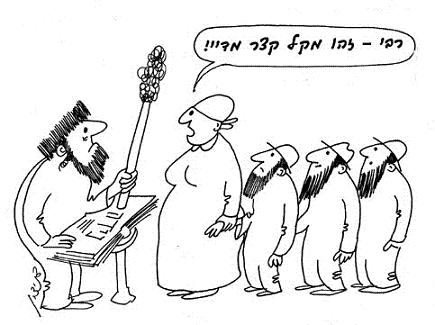
The early sages (Tanaaim) ruled that a woman who bleeds during sex three times must divorce her husband and marry another. Her bleeding forbids her to have sex with her husband, for she is niddah as she is during her period. “One who sees blood during sex should have sex once, twice, three times, and after that should not have sex until she divorces him and marries another.”
If she married another and this phenomenon returns, she divorces him and marries yet another man. If she married a third man and the phenomenon returns, the woman must check herself before the fourth time they have sex and every time after that — is the bleeding menstrual and sex forbidden or is the blood due to a wound and therefore sex is permitted? How should she check? She takes a stick with cotton or cloth on the head, inserts into her vaginal canal a cylinder which separates the cotton from her vaginal walls, and then inserts the stick, through the cylinder, up until her womb. If blood is found on the cotton it came from the womb and is menstrual; she is forbidden to have sex. If blood was not found it means that the blood is the result of a wound in the vaginal walls and she is permitted to have sex. The early sages added that if it is known that a woman has a wound in her womb then her bleeding during sex is a result and she is permitted to have sex. They also added that a woman is considered reliable to state if she has a wound in her womb from which she bleed during sex. According to the early sage Rabbi Shimon son of Gamliel, bleeding due to a wound in the womb is like menstrual bleeding and she is forbidden to have sex.
The scholars discuss the words of the early sages. Why did Rabbi Shimon son of Gamliel forbid bleeding due to a wound of the womb while other sages permit it? Answer: Rabbi Shimon son of Gamliel though that the womb impurifies any blood found there, regardless of whether it was menstrual blood or blood of a wound, while the other sages think that only menstrual blood is impurifying.
The scholars also ask: the method of examination suggested by the early sages, placing a cylinder in the vagina, may cause a wound if the cylinder is made of wood. Answer: The cylinder required is made of lead and its head is bent and rounded so it does not causes wounds. One of the scholars, Reish Lakish, asked: The early sages suggest examination after she has married three husbands. Why do they not suggest the examination when she is married to the first husband instead of insisting on divorce? His colleague Rabbi Yochanan answered that the woman may have seen blood during sex because the size of her husband’s sexual organ wounded her and therefore she should try a different husband with a different size sexual organ, one which may not cause her to bleed during sex. As Rabbi Yochanan put it, “not all fingers are the same.” The scholar asked: Why didn’t the early sages require the woman to check herself after the first intercourse with her third husband and not only require it after the third intercourse? Answer: Since each instance of intercourse, even with the same husband, is not the same, he may be using too much force sometimes and be more gentle other times, so the early sages required she wait until she sees blood three times and only then did they demand an examination. As Rabbi Yochanan said, “Not all force is equal.” The early sages required examination only after the woman saw blood during sex three times with three husbands, for that is proof that the woman sees blood during sex without relation to the amount of physical force exerted by the man (hard or gentle) during sex. There was an incident with a woman who saw blood when she had sex. She went to Rabbi (the editor of the Mishnah) to get his advice about what to do. Rabbi asked his student Avdan to frighten the woman so her shock will heal her from her bleeding during sex. The student went to frighten the woman and her shock caused her to drop chunks of blood, and so she was healed. There was another incident with a woman who saw blood during sex and went to ask advice of Rav Shmuel. He asked his student Rav Dimi to frighten her. After he frightened her she did not drop chunks of blood. Therefore Rav Shmuel concluded that she could not be helped and that she was forbidden to have sex.
There was another incident with a woman who, after becoming purified from her period and immersing, started to bleed from her womb. She went to ask advice of Rabi Yochanan. Rav Yochanan told her the reason that she saw blood is because her friend envied her marital harmony with her husband, so he advised that she have sex with her husband on the river bank, where she had immersed, so her envious friend would not know that she was pure and could have sex with her husband. There is another version in which he advised her to tell her envious friend that she sees blood after immersion and therefore cannot have sex with her husband. Thus, according to Rabbi Yochanan, her envy will end. Some say that her envy would turn to pity and the woman will stop seeing blood. One of the sages, Rav Yosef, related an incident of a woman in Pumbedita (a city in Babylon) who saw blood after her immersion. She did as Rabbi Yochanan suggested and was cured.
(Babylonian Talmud, Tractate Niddah 65b-66a)
